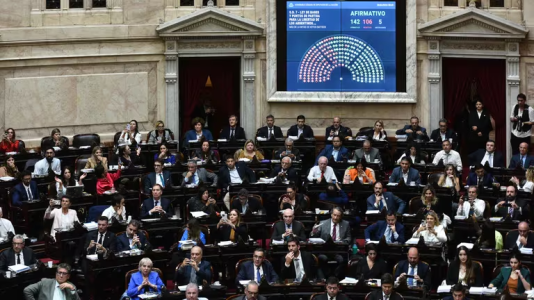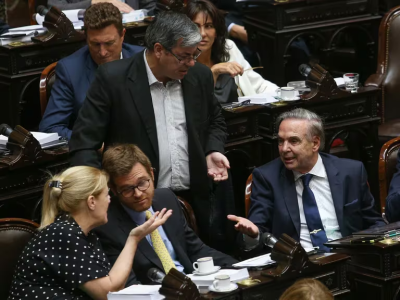All the Answers
Well-known member
After 142 days at the head of the Government, Milei achieved his first victory in Congress: the Bases Law obtained half a sanction in Deputies - Infobae

Source:
April 30, 2024
The project obtained 142 votes in favor, thanks to the majority support of the dialogue blocks, 106 against and five abstentions. Now the ruling party will have to overcome the challenge in the Senate
By Federico Millenaar

Base Law: the moment of the vote
The second version of the Bases bill obtained general approval in the Chamber of Deputies minutes before 9 in the morning with 142 affirmative votes (106 against), thanks to the majority support of the dialogue blocks ( PRO, UCR, Hacemos , Federal Innovation and MPN ). This is the first relevant victory that Javier Milei's government achieves in the National Congress, 147 days after coming to power .
UxP, the FIT, the socialists, and Natalia de la Sota from Córdoba voted against. The dissident radicals Facundo Manes, Fernando Carbajal, Marcela Coli and Pablo Juliano abstained , as did Mónica Frade of the CC. However, the curiosity was the presence at the time of the vote of Marcela Pagano , who had not been at the beginning of the session to provide a quorum due to health problems (triggered by a peak of stress due to internal discussions of the libertarian bloc).
In order not to repeat the same mistakes that led to the failure of the first debate in February, the ruling party managed to impose that the project be voted on by entire chapters , without entering into the debate article by article, and without any intermediate room. “They want to say little so that it happens quickly, so that the treatment is as dark and less transparent as possible,” denounced Germán Martínez, president of the Unión por la Patria bloc.
In this context, with 134 votes, the declaration of emergency in administrative, economic, financial and energy matters was approved for a period of one year .
The session included strong crosses and accusations but slowly tempers began to calm down. During the afternoon, the Secretary General of the Presidency, Karina Milei , and the Minister of the Interior, Guillermo Francos , arrived at Congress and met with Martín Menem in his office. As reported to Infobae , both officials did not come to participate in negotiations but to monitor the development of the session and to show political support.

The board of the Chamber of Deputies marks the result of the general vote (Photos: Adrián Escándar)
As the day averaged, the list of individual speakers - more than 130 - allowed us to calculate that the vote in general would be around 8 on Tuesday and that it would then be followed by several hours of debate in particular. For this reason, the premises began to empty. Most of the deputies retired to have dinner and get some sleep.
It was precisely as a result of the absence of the majority of the legislators that Unión por la Patria made motions to consider the quorum fallen. “We have 45 deputies present, there is no quorum to meet ,” said Martín Soria. “ As long as nothing is voted on there is no problem with the quorum, they should stop chicanering , they already did it all afternoon,” answered Miguel Ángel Pichetto with visible annoyance.
However, negotiations and counting of support continued well into the early hours of the morning because several articles still did not have a clear consensus.
acta_online_5142.pdf
 drive.google.com
drive.google.com
Article 3 was one of the most questioned, since it empowers the Executive Branch to “modify or eliminate the powers and functions” of public organizations that it considers unnecessary; You could also merge them, modify their legal structures or the number of employees. Although the opinion included at the request of the UCR a list of organizations that would be exempt, such as Conicet, Incucai, INTA or the Malbrán Institute, the wording of the text generates rejections. “In this model, if it occurs to them to close SENASA, they can do it, we are not going to support it,” explained Maximiliano Ferraro, president and deputy of the Civic Coalition.
At the time of the vote, the ruling party rejected requests to modify the wording to expand the list of public organizations that cannot be dissolved by the Executive Branch. It was finally approved with 135 votes in favor.

Miguel Ángel Pichetto and Germán Martínez
The Income Tax also received criticism from sectors of radicalism, the Hacemos bloc and deputies from Patagonian provinces. Everyone remembered that Milei himself had approved its elimination last year and that he had promised not to increase taxes.
“I cannot accompany the electoral scam of the Income Tax because we warned that (Javier Milei) was going to reduce spending, but in the campaign he did not say that the Income Tax was going to return and we want to ask the president for a stabilization plan” said UCR deputy Martín Tetaz .
The articles on privatization were approved by 138 votes in favor . There were strong disagreements over the impediment to voting on the articles separately. “ Radicalism seems to have a special regulation, it is a shame ,” said Myriam Bregman.
Meanwhile, questions about the Large Investment Incentive Regime (RIGI) - which implies tax, customs and exchange benefits for projects of more than USD 200 million - revolved around discrimination against smaller companies and economies. regional. In turn, the provinces pointed out that article 162, which establishes that if a province proposes a rule that goes against the facilities of the RIGI it is “null and void,” overwhelms the autonomy of the provinces.
“I am conceptually in favor of promoting investments, but not with this special regime, which in my case seems to me to have fallen short if I say that it is animalistic. This project has nothing to do with the development of our country, with that serious development project that we need,” said Pablo Juliano , from the radicalism sector led by Facundo Manes.
On the other hand, the tobacco provinces together with the UCR and We Make the Federal Coalition sought to reincorporate the chapter on tobacco taxes that was in the original text but was later withdrawn by the Executive Branch. This sector seeks to equalize the taxes paid by all companies. La Libertad Avanza and the PRO reject this initiative.

Marcela Pagano was not there to provide a quorum nor did she participate in the discussions, but she arrived to vote
When debating the articles of the labor reform, the radical bloc insisted on including the elimination of the solidarity fee that unions charge by agreement to non-affiliated workers. The bench led by Rodrigo de Loredo did not have greater support but sought to “expose” the deputies who voted “in defense of the union caste.”
Finally, the labor reform that includes, among other points, the extension of the trial period to six months, the option of the labor termination fund by agreement, the aggravation of compensation for discriminatory dismissal and the elimination of fines for unregistered work, was approved with 147 affirmative votes.
Another point in doubt is the money laundering included in the fiscal package. The Civic Coalition and the wayward radicals have already announced their rejection.
Before the general vote, Miguel Ángel Pichetto rebutted the libertarians' criticism of “politics” and assured that it was approved thanks to the efforts of politics. In that sense, he also demanded that the Government continue along the “path of constructive dialogue and stop offending Congress .”
The head of the PRO bench, Cristian Ritondo , also spoke out in favor of the project, recognizing that few governments took 5 months to have the tools to carry out their management plan. “ We are not a government or a co-government, but we feel the responsibility of voting ,” he concluded.
“We leave with the conviction that we did what we had to do. The President said that he is going to invite those who support this law to the May 25 pact, with us who will save the invitation and the canapé. “We are going to be with the people,” added Leopoldo Moreau.

